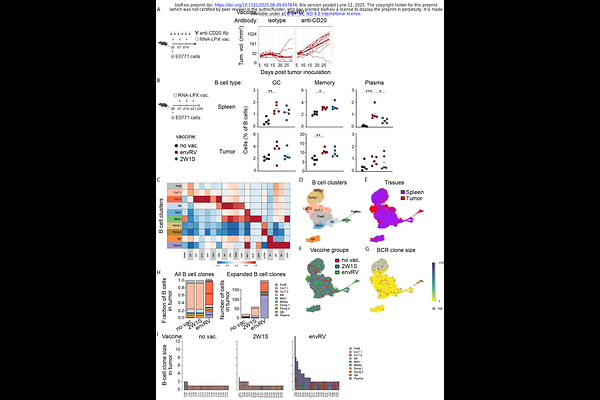A single MHCII neoepitope mRNA vaccine elicits CD4 T- and B- cell responses promoting endogenous CD8 anti-tumor immunity

A single MHCII neoepitope mRNA vaccine elicits CD4 T- and B- cell responses promoting endogenous CD8 anti-tumor immunity
Capietto, A.-H.; Balanca, C.-C.; Bouziat, R.; Wu, T.; Gober, J.; Carbone, C.; Nissenbaum, A.; Hoshyar, R.; Yadav, M.; Gutierrez, A.; Chestnut, Y.; Javinal, V.; Menon, H.; Darmanis, S.; de Simone, M.; Sun, Y.; Seshasayee, D.; Paluch, M.; Bulutoglu, B.; Jones, T.; Wang, Y.; Liao, L.; Duong, E.; Anand, A.; Antonelli, A.; Oei, Y.; Cheung, J.; Luoh, S.-M.; Ziai, J.; Preston, J.; Hung, J.; Freund, E.; Wichner, S.; Oh, J.; Tahtinen, S.; Sahin, U.; ElSohly, A.; Schartner, J.; Delamarre, L.; Mellman, I.; Linehan, J.
AbstractRecent progress in therapeutic cancer vaccines has shown promising clinical activity, especially when targeting MHC-class I (MHCI) neoantigen-specific CD8+ T cell responses in post-surgical patients. To explore the role of CD4+ T cells in vaccine-dependent tumor rejection, we constructed an mRNA lipoplex vaccine encoding a single MHCII-restricted neoantigen. The vaccine elicited Tfh and Th1 cell responses while decreasing Tregs, leading to rejection of established tumors in mice. IL-21 and IFN-{gamma}, crucial for Tfh and Th1 function respectively, contributed to anti-tumor activity. B cells and neoantigen-specific antibodies were also shown to participate in vaccine efficacy. Additionally, conventional type 1 dendritic cells (cDC1s) were essential for eliciting vaccine-induced CD4+ T cells, and both cDC1s and CD4+ T cells were required to enhance endogenous CD8+ responses, which were crucial for tumor control. Our results suggest that immunizing against MHCII neoantigens alone is sufficient to orchestrate a potent and cooperative immune response against cancer.